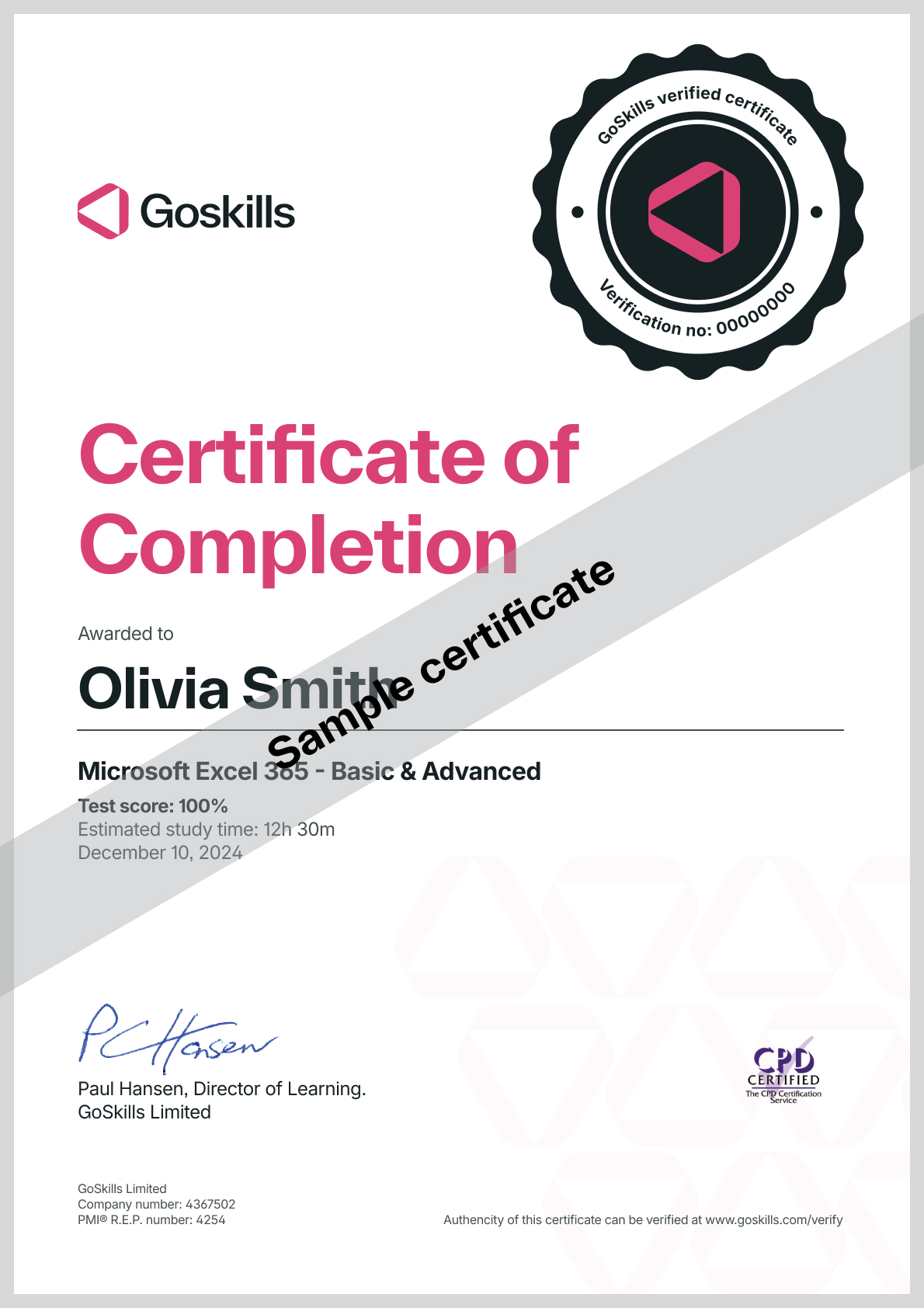Project Teams and Stakeholders
Project Teams and Stakeholders
Skills you’ll gain
Managing project teams and stakeholder expectations requires a transparent process, so nothing is left up to interpretation. In this Project Management for Team Members and Stakeholders course, you’ll master the art of good project communication, eliminating ambiguity from each stage of the project to improve coordination and decision-making.
For projects to run smoothly, it takes careful collaboration and alignment, which is why everyone, including stakeholders, team members, and managers, can all benefit from speaking the same project management language.
By the end of this Project Management for Teams and Stakeholders course, you’ll be able to:
- Identify stakeholders and prioritize their project goals.
- Understand project team structures, including team roles and responsibilities.
- Map the connections between team leaders, scrum masters, and other core members.
- Understand the fundamentals of team leadership, including decision-making, negotiation, mentoring, and emotional intelligence.
- Effectively communicate with teams to set goals, conduct efficient meetings, and run reviews and training.
- Perform a stakeholder analysis to understand their needs.
- Design a project team plan with 31 engaging lessons, including real-world examples and actionable exercises.
- Earn 15.5 PDUs or contact hours toward your Project Management education for certification with PMI.
This course is based on The Project Management Institute, A Guide to the Project Management Body of Knowledge (PMBOK® Guide) - Seventh Edition, Project Management Institute, Inc., 2021.
If your goal is to become a Certified Project Management Professional, then we recommend taking our additional courses on Project Management Framework, Project Planning, and Project Performance and Delivery.
Once enrolled, our friendly support team and tutors are here to help with any course-related inquiries.
Syllabus
Download syllabus-
1
Project Leader The Project Leader is responsible for ensuring the project team executes the project. 6m
-
2
Core Team Most large projects are managed by a cross-functional core team. Core team members have a dual responsibility; they are responsible for the project achieving its goals and they are responsible to ensure that the project complies with their function’s standards and best practices. 6m
-
3
Project Team Leader Team Leaders adapt to the business and team environment to ensure the team creates the performance or implements the change for which it was chartered. 6m
-
4
Scrum Master/Product Owner Agile Scrum projects rely on the leadership of the Scrum Master and Product Owner to assist the project team in accomplishing the project tasks. While neither of these individuals will be the project leader in a classic sense, both take on some of the typical responsibilities of project leadership that are necessary for effective project management. 6m
-
5
Agile Culture The Agile culture is a set of characteristics found in all the Agile methodologies. These characteristics are empowerment, adaptation, and a focus on performance. 4m
-
6
Team Building Project Team Building is a process that the Project Core Team normally goes through to improve team coordination and decision making. 4m
-
7
Virtual Teams It is common in today’s business environment to be a member of or lead a virtual project team. There are several unique challenges with these teams that the project leader must be prepared to address. 7m
-
8
Changing Team Members When project team members are changed, the project leader needs to manage both the process of saying “Goodbye” to one individual and saying “Hello” to another. 5m
-
9
Training Plan The temporary and often virtual nature of projects leads to the creation of a project team who has never worked together. Effective use of project resources requires that the project resources are capable of performing the assigned tasks. A growing element of project planning is planning for project team training and in some cases team member skill training. 5m
-
10
Measuring Training Outcomes In the typical project of today, a project training plan is essential to address the challenges with project resources. At this time in the project, the impact of the training plan that was developed is assessed. In addition, changes to the project team will likely require modifications to the training approach. 5m
-
1
Setting Team Goals Teams perform better when they have clear shared goals. One key element of good team leadership is helping your team establish team goals. This module will provide several suggested approaches for establishing goals and a set of criteria for good team goals. 6m
-
2
Decision Making Project Decision Making is the process whereby the project leader and project team decide upon project strategy, tactics, and acceptable actions. 6m
-
3
Team Negotiation Team members will often need to negotiate with each other on tasks and activities and the team leader may need to negotiate with the other managers or supervisors of team members. 6m
-
4
Conflict Resolution From time to time teams will experience conflict. When the team leader or team members are able to resolve the conflict in a positive manner, the team becomes stronger and performs better. 6m
-
5
Diversity and Inclusion Understanding and leveraging diversity can improve project team performance in many situations. An interesting aspect of diversity on projects that it includes both cultural diversity and technical diversity. Both of these should be actively managed. 7m
-
6
Mentoring Teams and Stakeholders Projects are unique and project team members are frequently changing. Project mentoring - which focuses on coaching and aligning project team members and stakeholders - is frequently required. In this case, it is less about long-term career mentoring and more about effective engagement with other project team members to ensure project objectives are met. 6m
-
7
Emotional Intelligence Principles Emotional Intelligence is a framework for improving communication and team dynamics. These principles can be used by a project manager to understand how to harness their own emotions and the emotions of others to achieve project goals. 5m
-
8
Applying Emotional Intelligence A project manager can use the principles of emotional intelligence to improve their active listening skills. In addition, the application of emotional intelligence to project team and stakeholder interactions can reduce conflict and improve alignment between individuals. 4m
-
9
Situational Leadership Project managers and core team leaders can use the framework of situational leadership to guide their interactions with team members. By assessing the readiness of team members, the project manager or core team leader can interact with a leadership style likely to improve team performance. 7m
-
1
Communication Management Project Communication Management is a very broad term that refers to all of the communication activities associated with the project. Communication is a key attribute of project management. 4m
-
2
Communication Constraints Teams rely on effective communication, yet there are many factors that can inhibit communication. When these factors are present, the team leader needs to proactively manage the team communication processes to overcome them. 5m
-
3
Team Meetings Team Meetings are a gathering of team members to discuss aspects of the project. Team pulse meetings focus on status. Team problem-solving meetings focus on problem resolution. 4m
-
4
Scrum Meetings During a Sprint, the Scrum Team meets daily at a Scrum Meeting to provide status on progress. 7m
-
5
Management Meetings Project Management Reviews are the formal documented meetings held periodically between senior management and the project team. 4m
-
6
Technical Reviews Project technical reviews are formal decision meetings between team members and a panel of subject matter experts. 4m
-
7
Sprint Demonstration Planning Sprint Demonstration Planning ensures that the Sprint Demo meeting appropriately reflects the work accomplished by the Scrum Team. 6m
-
8
Overcoming Misunderstandings Misunderstandings frequently occur within project teams. The project leader to demonstrate and encourage effective listening and clear communication to minimize these. This lesson illustrates several best practices for avoiding misunderstandings 7m
Certificate
Certificate of Completion
Awarded upon successful completion of the course.

Instructor
Ray Sheen
Ray is a certified Project Management Professional (PMP) with the Project Management Institute, a certified Scrum Master with Scrum Alliance, and certified Lean Six Sigma Black Belt with IASSC. He is a member of the Project Management Institute and the Product Development Management Association.
He is president and founder of Product & Process Innovation, Inc. and is a veteran business leader with over 25 years of executive, project management, and engineering management experience. Ray has worked in several industries including aerospace, electrical distribution and utilities, biotechnology, appliances, electronics, machining, medical devices, pharmaceutical, automotive, and financial services. He has held executive management positions in a Fortune 500 company and has been involved in entrepreneurial startup organizations.

Ray Sheen
Project Management Instructor & Author
Accreditations
Link to awards PMI, PMP, CAPM and PMBOK are registered marks of the Project Management Institute, Inc.How GoSkills helped Chris
I got the promotion largely because of the skills I could develop, thanks to the GoSkills courses I took. I set aside at least 30 minutes daily to invest in myself and my professional growth. Seeing how much this has helped me become a more efficient employee is a big motivation.



